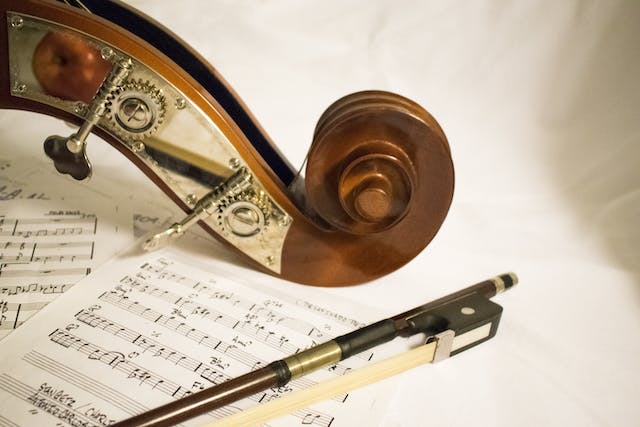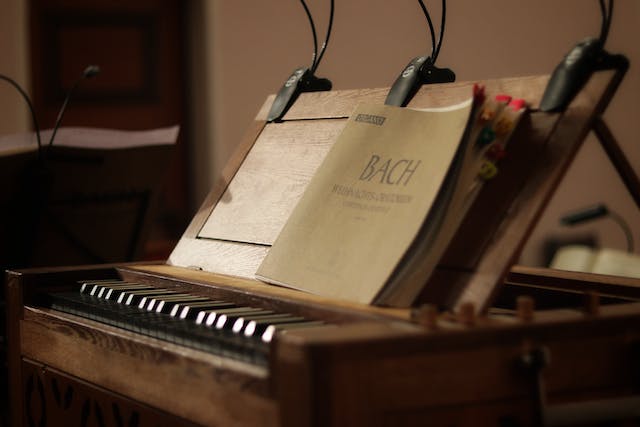Can classical music improve concentration and memory in students?

Table of content
Can classical music improve concentration and memory in students? - Introduction
In exploring the nuanced relationship between classical music and educational success, this article delves into a realm where melody intertwines with memory, and harmony converges with focus.
The timeless strains of classical music have long been celebrated for their aesthetic beauty, but recent studies suggest a more practical application: enhancing students' concentration and memory.
Through a series of case studies and real-life examples, this piece aims to unravel the layers of this intriguing hypothesis.
From the quiet halls of Finnish elementary schools to the vibrant classrooms of American high schools, educators worldwide are experimenting with the power of classical tunes to boost academic performance.
This exploration is not just about music; it's about understanding its potential role as a catalyst in the learning process, reshaping the traditional educational landscape.

KEY TAKEAWAYS
Classical Music Enhances Learning: Empirical studies, including one by Stanford University, have shown that classical music can significantly improve students' concentration and memory, aiding in various educational activities like studying and writing research papers.
Historical Role of Music in Education: Music has played a crucial role in education throughout history, from ancient Greece to the Renaissance, influencing educational philosophies and practices, and is believed to unify the mind and soul, enhancing cognitive and emotional development.
The Mozart Effect: The concept of the "Mozart Effect" suggests that listening to Mozart's compositions may temporarily boost cognitive functions, including focus and memory, although the extent and duration of this effect are subjects of ongoing research.
CalypsoRoom – A Modern Musical Platform: CalypsoRoom emerges as a unique online platform where students and music enthusiasts can connect through webcams, offering a communal space for sharing and enjoying music, which aligns with the cognitive benefits of musical exposure.
Challenges and Variability in Music's Impact: While the benefits of classical music in educational settings are well-documented, there are criticisms and counterarguments, highlighting the subjectivity in music's impact on individuals and the potential for classical music to distract some students, underlining the need for tailored and inclusive music integration strategies.
Case Studies and Real-Life Examples
Empirical evidence underscores the beneficial impact of classical music in educational settings, particularly in enhancing students' concentration and memory.

Understanding how music has historically fostered intergenerational connections offers insight into its enduring appeal, as explored in more depth at music connects different generations.
A study conducted by Stanford University researchers highlights how classical music aids in focusing attention, making information retention during studying more effective.
This aligns with broader findings, where numerous case studies echo the sentiment that music, especially classical strains, contributes significantly to improved academic performance.
Students engaged in intellectually demanding tasks, such as writing research papers, often find that the right selection of music not only minimizes distractions but also fosters a conducive environment for creativity and productivity.

This is particularly relevant in the context of time management, a critical skill in contemporary academia.
It's noteworthy that many students complement their studies with professional services, opting to pay to write paper, where well-researched and articulate writing is a staple.
The synergy between the harmonious backdrop provided by classical music and the structured support of these online platforms represents a modern approach that aligns with the evolving needs and preferences of students striving for academic excellence.
In Finland, for instance, an elementary school known for its innovative teaching methods observed enhanced focus and memory retention in students when classical music was integrated into their study sessions.
Similarly, a high school in the United States employed classical music during study periods, noting a marked improvement in students' ability to concentrate and remember information.
These instances, along with others, collectively demonstrate the potential of classical music to augment cognitive functioning in educational contexts.

The Science Behind Classical Music and Cognitive Function
The profound impact of classical music on our emotions is universally acknowledged. However, its influence extends beyond mere aesthetics, delving into the realm of cognitive enhancement.
This article examines the intriguing possibility that classical music could bolster focus and memory in children, offering a fresh perspective on its educational applications.
The role of classical music in developing emotional intelligence is a fascinating aspect, further detailed in an article about music and emotional intelligence.

Advanced research, utilizing tools like functional Magnetic Resonance Imaging (fMRI), has revealed that classical music actively engages various brain regions, including those responsible for emotions, memory, and decision-making.
Notably, it stimulates the prefrontal cortex, the hub of higher-order thinking.
The much-discussed "Mozart Effect". suggests that listening to Mozart may temporarily enhance certain cognitive functions.
Furthermore, the calming influence of classical music can indirectly boost brain performance by reducing stress and anxiety, thereby improving concentration and memory retention.
Exploring how music expresses emotions that words cannot is an intriguing aspect, further elaborated in music expresses what words cannot.
These findings underscore the possibility that classical music can intricately enhance the brain's complex neural networks.
This exploration into the intersection of classical music and brain function sets the stage for further discussion on how it could be a transformative tool in enhancing children's intellectual development.

Historical Perspective on Music and Learning
The role of music in education is deep-rooted, tracing back to ancient times when the Greeks recognized its value in learning.
In the Middle Ages, it formed a crucial part of the trivium and quadrivium, the core liberal arts subjects. This period saw music as a unifying force for the mind and soul, influencing educational philosophies like those of Boethius.
The Renaissance marked a resurgence of interest in traditional arts and education, with figures like Johann Sebastian Bach advocating for music's inclusion in school curricula.

This era solidified the belief in music's intellectual benefits, laying the groundwork for future educational approaches.
The 20th century witnessed a focused examination of music's role in learning.
Pioneers like Maria Montessori championed music for its holistic impact on early childhood development, linking it to cognitive, emotional, and social growth.
This historical journey underscores music's enduring significance in education, setting the stage for exploring how classical music specifically can enhance contemporary students' concentration and memory.
Practical Applications in the Educational Setting
Integrating classical music into school curriculums offers a unique way to enhance students' concentration and memory.
In the classroom, dedicating specific periods for listening to classical music during study, reading, or test-taking sessions can be beneficial.
Teachers can tailor this experience by exploring various composers and styles, aligning with students' preferences, thus personalizing the learning environment.
Leveraging technology, such as streaming services, facilitates easy access to a wide range of classical tracks.

The significant impact of technology on the accessibility and experience of music in modern education is thoughtfully examined in impact of technology on music.
The selection of compositions is crucial, as different works evoke varied cognitive responses.
Soothing pieces by Mozart or Bach might aid in learning environments, while the energetic rhythms of Beethoven could enhance focus.
Consistent and routine integration of classical music helps students associate these melodies with concentration and learning, fostering a conducive academic atmosphere.
While classical music offers many advantages, educators should be mindful of potential challenges, like varying emotional responses and musical tastes among students.
Open dialogue with students about these musical choices can help refine this educational approach, making it more effective and inclusive.
CalypsoRoom: A New Era of Musical Connection
In the realm of enhancing learning experiences with music, CalypsoRoom emerges as a unique and modern platform.
This innovative online space invites students and music enthusiasts alike to connect through webcams and immerse themselves in a diverse range of musical experiences.
At CalypsoRoom, participants have the opportunity to listen to and share music, fostering an environment of communal learning and enjoyment.
Can classical music improve concentration and memory in students? - Conclusion
In conclusion, the journey through the impact of music on learning underscores its vital role in enhancing cognitive functions.
As we've explored, from ancient philosophical insights to modern scientific research, music, especially classical music, is a powerful tool for improving concentration and memory.
Amidst this, CalypsoRoom emerges as an innovative platform, offering a unique space for students and music enthusiasts to connect and immerse in diverse musical experiences.
We invite you to join the CalypsoRoom community, where the power of music is just a click away, ready to transform your learning and listening experience.
Thanks for reading,
Scott Roberts
Frequently Asked Questions (FAQs)
What is the Mozart Effect and how does it relate to concentration and memory?
The Mozart Effect refers to the theory that listening to Mozart's music can temporarily enhance certain cognitive functions, particularly concentration and memory. This concept suggests that the complex structure of Mozart's compositions may stimulate the brain, leading to improved mental performance.
Can listening to classical music enhance brain function in students?
Yes, listening to classical music can enhance brain function in students. Studies have shown that classical music, with its unique rhythms and structures, can improve focus, memory, and cognitive processing, thereby aiding in academic performance.
Are there specific classical music compositions recommended for improving focus?
Certain classical music compositions are recommended for improving focus, such as Mozart's sonatas or Bach's concertos, known for their structured and harmonious melodies. These compositions are believed to create a conducive environment for concentration and mental clarity.
How does classical music affect cognitive processes like memory and attention?
Classical music positively affects cognitive processes like memory and attention by stimulating brain regions associated with these functions. The complex melodies and rhythms in classical music engage the brain, thereby enhancing memory retention and increasing attention span.
What are the scientific studies that support the impact of classical music on concentration?
Scientific studies supporting the impact of classical music on concentration include research by Stanford University, which found that classical music aids in focusing attention and retaining information. Other studies have replicated these findings, showing how classical music's structured rhythms and melodies can enhance cognitive processing and concentration.
back
Written by Scott Roberts
Scott Roberts is a freelance writer passionate about arts, music, and education. He writes for famous magazines and has a lot of experience in journalism. In his free time, Scott travels a lot, and since he is fond of the music industry, he tries to do some songwriting.
Updated December 2023
Company number: 681223
James's Walk 31, Dublin, Ireland
contact@calypsoroom.com
+353 (89) 435 8928




